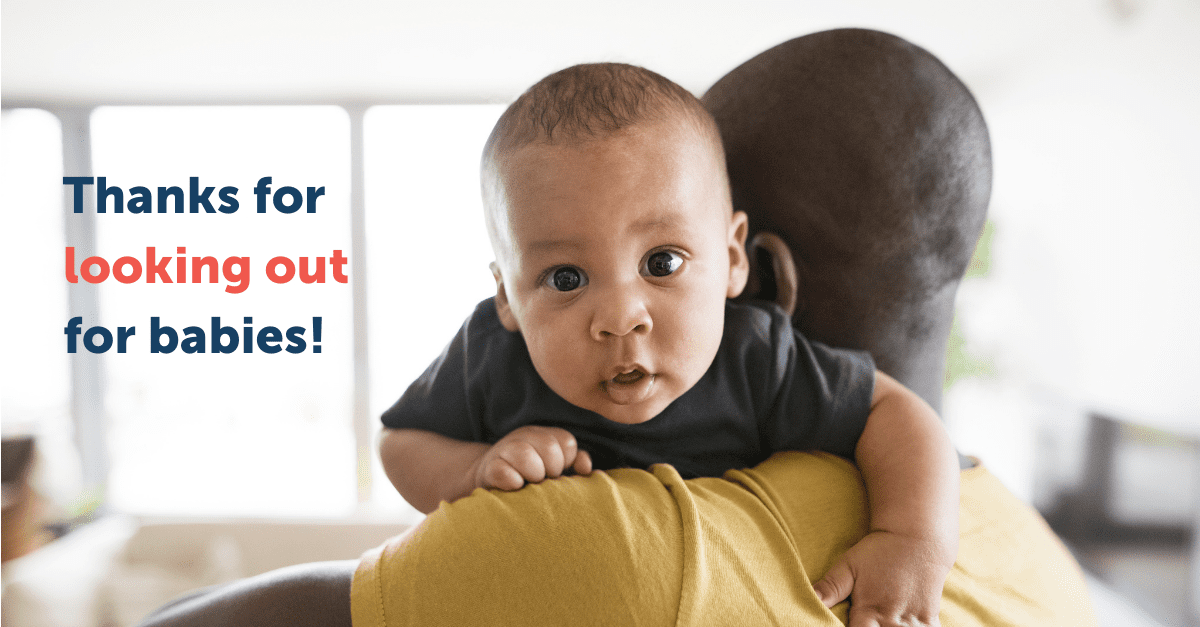This year, babies and families have had powerful champions, with extraordinary results. Policymakers are learning about the potential of the first three years of life and taking action, but we are far from done.
As we look back on an eventful year, these are just some of the ways we have advanced policy change for babies.
- Advocates showed up for babies and families. Time and time again, baby champions have continued to urge leaders to prioritize the needs of infants, toddlers, and their families. Thousands of individual advocates and 75 national and state organizations have joined forces to Think BabiesTM, adding to the power of our collective network. And you made some noise! Over the course of the year, Think Babies advocates’ messages demanding the supports infants and toddlers need reached every Member of Congress. And despite not being able to gather in person, we took Strolling ThunderTM virtual, connecting families and their babies from all 50 states and DC to their Congressional offices.
- Congress passed the landmark $1.9 trillion American Rescue Plan Act, responding to the needs of babies in the pandemic as part of COVID-19 relief efforts. This legislation added funds to reach the $50 billion needed to sustain child care through the pandemic, a historic recognition of child care as an essential service. Other provisions recognized the dire economic straits of families, providing temporary enhanced unemployment assistance, direct payments, a fully refundable and enhanced Child Tax Credit, and housing and food assistance. This legislation also included much-needed mental health funding in record amounts for the Community Mental Health Block Grant and the National Traumatic Stress Network and allowed states to provide 12 months of postpartum coverage for women and children served by Medicaid or CHIP.
- State legislatures recognized the importance of early economic security. When babies are young, their development is most sensitive to their families’ economic stress. Babies benefit from the stability that comes from their parents’ ability to meet basic needs, such as stable housing, food and nutrition, and even diaper supplies. This year, the District of Columbia passed the Child Wealth Building Act and established a Monthly Basic Income, while Connecticut became the first state in the country to create “Baby Bonds” for children born in the state who live in families with low income. These policies are designed to bolster economic security for families with young children and create an environment where babies can thrive.
- States made strides in child welfare, and it gained attention at the national level. Arkansas, New Jersey, Ohio, South Carolina, and Washington State implemented the Infant-Toddler Court Program (ITCP) for the first time this year. Additionally, Florida appropriated nearly $2 million of recurring funds to support infant-toddler courts statewide, and Washington State passed legislation to codify components of the ITCP and opened three new sites across the state. At the federal level, the bipartisan Strengthening America’s Families Act was reintroduced in Congress by Rep. DeLauro (D-CT) and Rep. Bilirakis (R-FL). If passed, it would offer federal support to states in implementing ITCPs.
- The Strolling Thunder Family Advocacy Network launched. Building on the powerful advocacy of Strolling Thunder alumni over the past five years, ZERO TO THREE recently launched the Strolling Thunder Family Advocacy Network. Through the Network, we are partnering with families who participated in national Strolling Thunder events to build a powerful and engaged corps of family advocates who are fighting for the policy changes babies and their families need. The Network, led and driven by a diverse community of parent advocates, will keep families centered in our advocacy efforts and help inform the work of the ZERO TO THREE Policy Center.
- Infant and Early Childhood Mental Health (IECMH) gains traction on Capitol Hill and across the country. In the wake of the pandemic, Congress is giving considerable attention to mental health. Senator Michael Bennet (D-CO) joined the ZERO TO THREE Annual Conference to talk about his commitment to including IECMH in the plan to revamp the mental health system that he is building with Sen. John Cornyn (R-TX). Their bipartisan effort to create policies to support babies’ mental health aligns with the broader vision of the Senate Finance committee to advance mental health reform legislation in the 117th Congress. In addition, Senate and House appropriations advanced infant and early childhood mental health measures. The increased investments highlight emerging recognition that early support and intervention can change the course for children experiencing or at risk of developing mental health disorders. Earlier this year, Senators Dick Durbin (D-IL), Shelley Moore Capito (R-WV), Tammy Duckworth (D-IL) and Lisa Murkowski (R-AK) reintroduced the Resilience Investment, Support and Expansion (“RISE”) from Trauma Act to expand the trauma-informed workforce and increase resources for communities. The bill gives specific attention to the needs of trauma-affected young children, the specialized training required for clinicians who work with them, and provider shortages. This year, California became the first state to pay for preventive behavioral health services for children and caregivers. The new Medicaid benefit means young children and their caregivers can get support for behavioral health concerns together and much earlier, preventing them from worsening. In addition, to support best clinical practices for the birth through five population in Washington state, Medicaid will allow for reimbursement for mental health intake and assessment among clinicians trained to use DC: 0-5TM.
- Family child care and family, friend, and neighbor (FFN) providers established ground as an essential part of a mixed delivery child care system, providing crucial supports to families during the deepest moments of the COVID-19 pandemic. In response, states bolstered systems that enhance these types of child care. Minnesota expanded their innovative approach to supporting FFN providers across the state, honoring parent choice in choosing child care for their infants and toddlers. And a highly responsive approach in Connecticut established a new hub and expanded to 12 family child care networks that cover that entire state, ensuring that family child care providers are receiving individualized supports.
- Policymakers took action to address disparities in maternal and infant health. In recognition of starkly different experiences for pregnant women and infants in the health care system, as detailed in Racism Creates Inequities in Maternal and Child Health, policies to improve care and reduce gaps made progress federally and in several states. In particular, the Black Maternal Health Momnibus Act, introduced by Rep. Underwood (D-IL), Rep. Adams (D-NC), and Sen. Booker (D-NJ), with comprehensive attention to maternal and child health and attention to underserved communities, gained significant support in the House. Big bills for children and families this year included key provisions for pregnant and postpartum women and children, notably the American Rescue Plan and the Build Back Better Act, which includes all eligible provisions of the Momnibus. States also took action. See examples below.
- Think Babies state partners made big strides for little kids. Think Babies state partners continued to move efforts to address the needs of infants, toddlers, and families. Colorado passed a historic birth equity package, a total of three bills addressing health disparities for pregnant, birthing, and postpartum people; infants and their families; as well as securing an important win regarding residential zoning for family child care, easing costs, and reducing barriers for those providers. In Georgia, the state established the Georgia Association for Infant Mental Health, and the legislature passed paid family leave for state employees. New Jersey secured big home visiting wins, including securing passage on a bill providing every family welcoming a new baby into their home with a home visit by a registered nurse, and new state investments to cover gaps in existing evidence-based home visiting programs resulting from flat federal funding. North Carolina extended postpartum Medicaid coverage to 12 months and increased funding for Smart Start to support home visiting and other child health, family support, and child care measures. Finally, Rhode Island won Medicaid and commercial health insurance coverage for perinatal doula coverage and added two more weeks to the state’s paid family leave program.
- The Build Back Better Act is poised to accomplish a big, bold baby agenda that includes paid leave, child care, and Child Tax Credit measures. In November, the House of Representatives passed their version of the Build Back Better Act, a once-in-a-generation investment in families and young children nationwide. The bill would establish long-needed comprehensive family policy that would help millions of babies reach their full potential. Particular provisions include comprehensive paid family and medical leave, an expanded and extended Child Tax Credit, and child care that would get high-quality, affordable child care to the vast majority of this nation’s infants and toddlers. The bill also provides key investments in child nutrition, maternal and child health, and housing. Currently, the Senate is negotiating its own version of Build Back Better.
In 2021, families and babies continued to navigate the COVID-19 pandemic and its economic backlash, a deficient system of services failing to meet families’ needs, and continued inequities for babies of color and those in families with low incomes. Despite the challenges, baby champions – from parents and caregivers to early childhood professionals to advocates – continued to hold babies and toddlers and their experiences in the light, urging federal and state policymakers to take notice.
And they heard you! They heard about the struggles families with young children face every day. They heard about families challenged to make ends meet without the paid time off they need to care for their babies. They heard about the trauma families are facing and their all too frequent fights to find the services they need. They heard about the uphill battle child care providers face staying open in an economy that undermines their financial well-being. Now, durable public policy solutions to support the youngest children and the people who care for them in times of calm and crisis are taking hold.





